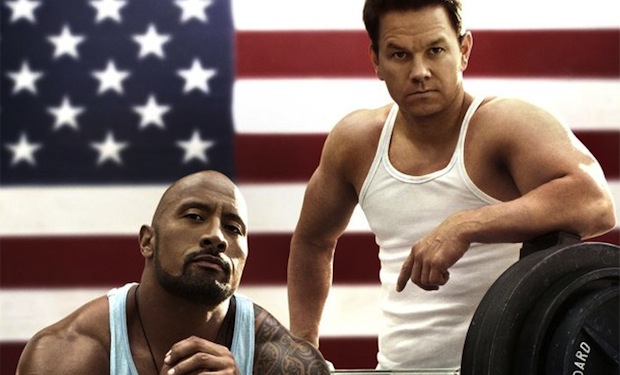By Armond White
Michael Bay sees like an ad-man gone wild— glorifying everything–a vision that corresponds to the age’s consumerist sensibility: greed and the need for speed. In Pain & Gain this style—and it is a genuine style, not fake flashiness like Trance or Side Effects—expresses the lusty and acquisitive desires of its lead characters, gym rats and thieves Daniel Lugo (Mark Wahlberg), Paul (Dwayne Johnson) and Adrian (Anthony Mackie) and their coarse, avaricious kidnap victim Victor Kershaw (Tony Shaloub).
 The trio of this gorilla-muscled caper comedy plots to take the tough-conniving immigrant Kershaw’s wealth. Even the late-arriving law-bringer, private detective Ed DuBois (Ed Harris), is served by Bay’s visually extravagant view of peaceful American luxe; retiree DuBois inhabits the dream despoiled by restlessness and selfishness.
The trio of this gorilla-muscled caper comedy plots to take the tough-conniving immigrant Kershaw’s wealth. Even the late-arriving law-bringer, private detective Ed DuBois (Ed Harris), is served by Bay’s visually extravagant view of peaceful American luxe; retiree DuBois inhabits the dream despoiled by restlessness and selfishness.
Bay’s signature trope—an up-tilted 360-degree pan—provides the kinetic equivalent of traveling up (never down) the grooves of a screw. His swerve hyperbolizes upward mobility, all-American aspiration. Such shots let Bay study his subjects while also exalting them, catching the self-infatuated ambition of Daniel and crew, Miami’s Sun Gym Gang.
“I believe in fitness.” Daniel says, his faith in physicality comes from a real-life 1995 kidnap scheme involving a team of Florida bodybuilders. That opening line is a sociopath’s version of “I believe in America” in The Godfather and, indeed, Daniel acknowledges “the guys from The Godfather” and Scarface and GoodFellas as “heroes.” Through this declaration, Pain & Gain measures the distance our culture has travelled toward ruthlessness and inanity.
Belonging to that vain, delirious culture, Bay’s style precisely satirizes it. Being American his exaltation doesn’t misrepresent as his ad-man predecessors Britons Ridley Scott, Tony Scott and Adrian Lyne did when corrupting popular film (and Americans’ view of themselves) with over-hyped narrative tropes in the 1980s. None of their cartoonishly inauthentic protagonists from Flashdance to Top Gun, Thelma and Louise to Fatal Attraction and Indecent Proposal struck the true notes that Bay catches in Pain & Gain. Bay’s hype advances the advert style in visionary ways; his images go Pop with Lichtenstein formality but his photographic palette can be lustrous, a comment on nature and real-life perception. Pain & Gain’s colors recall the explosion of bourgeois materialism at the end of Antonioni’s Zabriskie Point. If you think that’s reaching, you don’t get half the pleasure of Bay’s art; his ability to make disposable genres excitingly vivid.
In one of the most remarkable close-ups of the millennium, Bay zooms-in on Daniel’s irrational face-to-face explosion with Kershaw: “I DON’T JUST WANT EVERYTHING. I WANT YOU NOT TO HAVE IT!” That’s the rage of the age, the fervor of a seething, unmoored culture. Wahlberg’s Marky Mark boyishness is swollen with egotism here. Daniel’s outburst isn’t about materialism, the close-up of his wide eyes shows more than pumped-up personal insecurity (he’s probably the most confident lunatic in contemporary cinema). Daniel’s wrath illustrates hunger for power (and impotence is a secondary theme, acted variously and hilariously by Johnson and Mackie).
In its steroid-fueled way, Pain & Gain’s 1990s does for our era what Arthur Penn’s Bonnie & Clyde did for the 1960s. This glamorized nostalgia isn’t about the counterculture but the underculture, the manic urge for materialism and covetousness that lies beneath the millennium’s p.c. surface. At first, Daniel’s outrageous caper made me think “This is why the world hates America” but Daniel’s kind is worldwide—perhaps West-influenced but still accountable for itself (c.f. any terrorist). Screenwriters Christopher Markus and Stephen McFeely tell this mad story by juggling multiple voice-over perspectives with blithe sophistication (unlike Richard Linklater’s grim, dim-witted hipster comedy Bernie.)
Much of Pain & Gain’s fun makes us accountable in lines like the immigrant-stripper (Bar Paly) who praises “the land of opportunity, I saw Pretty Woman!” Oliver Stone made similar points last year in Savages, so did Todd Solondz’ Dark Horse and the Coen brothers in Burn After Reading, but none of those good films had Pain & Gain’s new car look. (Among many quick gags, Daniel sees a purple Lamborghini and immediately calls “Dibs!”)
Until now, Bay’s hyped-up style always seemed incompatible with screenwriters’ literacy and seriousness. But the body and sensation-centered Pain & Gain makes meaning narratively and kinetically—through the pandemonium we’re accustomed to every digitalized day. It gives the lie to Obama’s “That’s not who we are”—a catch-all reprimand for every display of American insensitivity and decay. Bay may be modern cinema’s least “sensitive” auteur—never sadistic like Haneke or Tarantino and yet not pious for a second. As a millennial master, Bay’s hype machine is a funhouse mirror.
Follow Armond White on Twitter at 3xchair
